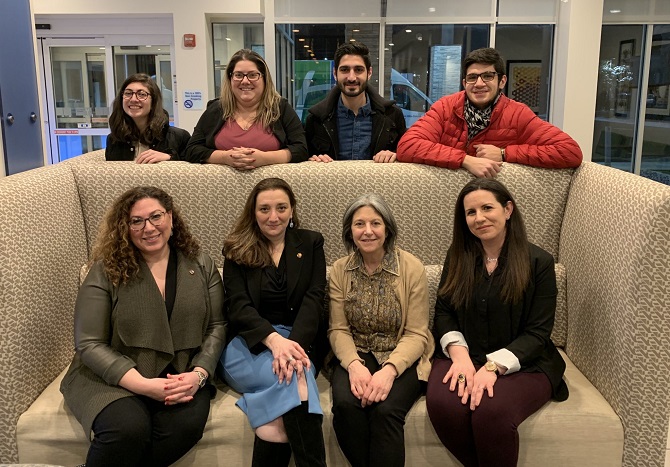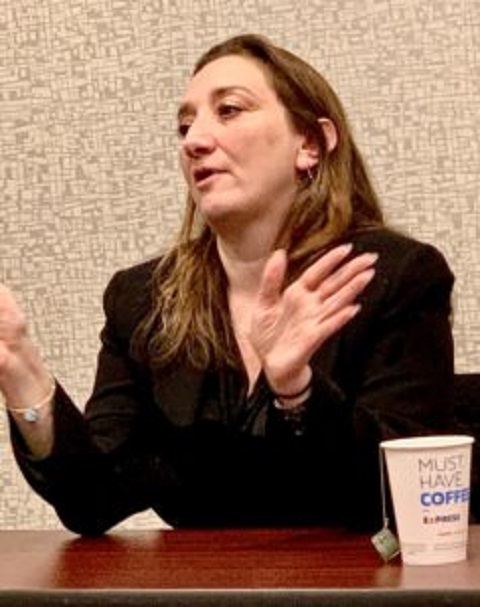The Armenian Weekly. FARMINGTON HILLS, Mich.—Protecting, defending and advancing Artsakh’s security, independence and recognition are at the top of this year’s national, regional and local Hai Tahd agenda.
That was the message delivered by ARF Eastern Region US Central Committee Vice-Chair Ani Tchaghlasian at the ANC of Michigan’s community town hall on Saturday, Feb. 8 at the Holiday Inn Express in Farmington Hills, Michigan.
“For this year, the main topic and where we feel the most danger is related to Artsakh,” Tchaghlasian said.
She highlighted continuing Fiscal Year 2021 aid to Artsakh as “one of our biggest issues” because the Trump administration has removed Artsakh aid from the budget it received from Congress, contrary to prior US foreign aid budgets of the past 15 years which contained comparatively small, but meaningful amounts of money to fund the Halo Trust’s critical de-mining work in the young republic.
Read also
“The demining program has probably saved thousands of lives and allowed the Armenian population to grow into areas that were heavily mined that would not have been able to be populated otherwise,” Tchaghlasian explained. “There’s still a lot of work to be done. Artsakh is not de-mined completely, but this year, the State Department has told us very clearly that they do not support any aid to Artsakh. This is a major, major issue for us.”
Tchaghlasian said that there are “many” reasons why the State Department has taken the “no aid” position toward Artsakh, including punishing Armenia for its relationships with Syria and Iran and rewarding Azerbaijan for its recent policies against Iran, bolstered by political goodwill purchased through its multi-million-dollar lobbyist contracts.
“We have a huge avalanche to deal with, but one of the main goals this year is to maintain some amount of aid to Artsakh so we’re not in a place where we’re fighting to get it back. We have to pressure our elected officials to put pressure on the State Department because both houses had aid to Artsakh line items removed by the administration.”
As for the Republic of Armenia’s political moves regarding the future of Artsakh’s territorial integrity, Tchaghlasian said, “We don’t know what’s happening behind closed doors. It wouldn’t be beyond our imaginations to think that there may be proposals that people are talking about that would be unacceptable to us, that would endanger Artsakh’s existence.”
That’s why local Hai Tahd committees across the Eastern Region are being tasked with a 2020 work list that prioritizes efforts to enhance Artsakh’s local profile and among elected officials in all levels of government, including social, humanitarian and economic efforts that keep non-Armenians connected to the country.
“The more traffic Artsakh gets from foreigners, the more it becomes normal for it to be on a path to recognition,” Tchaghlasian added, noting that sister city connections between Artsakh’s cities and villages and those in the eastern US with influential Armenian communities can be leveraged for meaningful interaction, engagement and understanding.
“Artsakh is a very isolated place. Artsakh is a place where people often feel alone,” Tchaghlasian explained. “Getting a piece of paper from a place they can’t place on a map is such a big deal for them. These people are in a constant war situation. There’s not a family that’s not been affected by the war in Artsakh. We can help by bolstering the self-confidence of the Artsakh people.”
Tchaghlasian emphasized that local efforts to pass Artsakh recognition legislation at the state and local levels, in addition to advancing exchange programs, allow those living in the eastern US to play “a very important role in Artsakh” where the stakes are so high.
“Without protecting Artsakh’s safety and independence, it isn’t just Artsakh we could lose. We would lose a significant part of the Republic of Armenia as it currently stands today.”
Another relevant local Hai Tahd committee agenda item is to advance community understanding for the 100 year-old Treaty of Sevres establishing the Republic of Armenia’s territorial boundary as envisioned by US President Woodrow Wilson in 1920. The treaty expanded the Republic of Armenia’s territory to include certain Armenian-populated lands in eastern Turkey, including Trabizon to provide access to the Black Sea.
Tchaghlasian said understanding the Treaty of Sevres is essential to having a more complete understanding of Armenian Genocide reparations, essential for Armenian Genocide justice.
“We have to first explain what it is we’re all talking about, and why just recognition isn’t enough, why justice means reparations,” she added. “We need to start that dialogue this year.”
The year 2020 is also an election year that includes the presidential race. Tchaghlasian observed that the sometimes-divisive political climate on social media has recently impacted perceptions about the Armenian National Committee’s (ANC) political leanings.
“Once and for all, ANC is not for Republicans or for Democrats. ANC is about Hai Tahd. We only care about issues that are Hai Tahd related. I don’t care if someone’s a Democrat, they’re a Republican, or if they come from Mars. It makes no difference to us.
“The bottom line is that for our issues, we have to be really smart as Armenians and vote for what’s best for us as a community. And sometimes that’s going to be the Republican and sometimes that’s going to be the Democrat.
“This is where Hai Tahd work is so important at the local level. We need to know our representatives well so that we are making the right choice for our cause, we’re making the right choice for all of our martyrs, we’re making the right choice for those soldiers that are fighting on the border in Artsakh. We should be supportive of candidates who support our cause. That’s it. It’s very simple.”
A lively question and answer session followed the presentation which can be viewed on the ANC of Michigan’s Facebook page.
Georgi-Ann Bargamian Oshagan
Main photo: ANC of Michigan members with ARF Eastern Region US Central Committee Vice-Chair Ani Tchaghlasian





















































